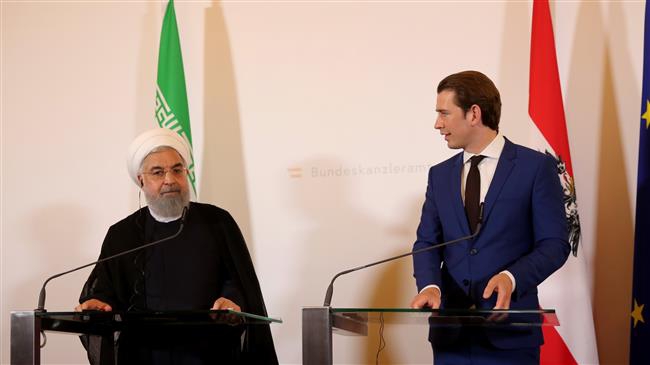Wednesday 4 July 2018 - 22:06
Story Code : 311223
Rouhani: US exit from Iran nuclear deal will benefit no one
�Both of us agree that we should try to keep this agreement. We see eye to eye that the US move [to withdraw from the deal] is illegal, against�international obligations and to the detriment of the US�and all countries,"�Rouhani said during a joint press conference with Austrian Chancellor Sebastian Kurz in Vienna on Wednesday.
"The withdrawal of the US from this agreement is not in the interest of anyone,� the Iranian president added, stressing that�the nuclear deal was the outcome of diplomacy and logic.
The Austrian chancellor, for his part, said his country and the European Union were committed to the JCPOA, adding,��We hope that the talks that will take place in Vienna in the coming days between the foreign ministers of the other parties to the agreement about developments regarding the withdrawal of the United States will have positive results.�
Foreign ministers from China, France, Germany, Britain and Russia will meet with Iranian officials on Friday in Vienna to discuss how to keep the JCPOA alive after the US exit from the pact, Reuters reported.
EU�foreign policy chief Federica Mogherini confirmed the meeting in a statement on Wednesday.
�Iran to remain in JCPOA if interests guaranteed�
Earlier in the day, Rouhani held talks with his Austrian counterpart Alexander Van der Bellen, during which he said Tehran would remain committed to the JCPOA without the US if its benefits were guaranteed.
�If Iran can well benefit from the JCPOA, it will safeguard it and if other signatories to the agreement can guarantee Iran�s interests, it will remain committed to the JCPOA without the US,� Rouhani said.
He described the JCPOA as a very important agreement for Iran, the European Union and the world, and called the US withdrawal from the agreement illegal.
�The US move runs against [international] law, UN Security Council resolutions and multilateral commitments, and will undoubtedly hurt the US and others, that is, the decision taken by the United States is not and will not be in the interest of any one, and this is a strange decision that a government makes in contrary to its own national interests and those of others,� he noted.
Rouhani said Iran expected the five remaining signatories to the deal to keep their trade ties with Tehran intact in the face of US sanctions.
�In our talks today, we emphasized that the era of unilateralism is over, and a country cannot decide for the world and other nations or violate the sovereignty and independence of other countries because it is contrary to the [UN] Charter, international regulations and global peace and interests,� he added.
Rouhani also said that the two sides discussed their trade, economic and cultural ties and regional developments, including the Yemen war, Iran�s fight against terrorism and its assistance to the Iraqi and Syrian nations.
US President Donald Trump announced on May 8 that Washington was walking away from the nuclear agreement, which was reached between Iran and the five permanent members of the UN Security Council - the United States, Britain, France, Russia and China - plus Germany.
Trump also said he would reinstate US nuclear sanctions on Iran and impose "the highest level" of economic bans on the Islamic Republic.
Under the JCPOA, Iran undertook to put limits on its nuclear program in exchange for the removal of nuclear-related sanctions imposed against Tehran.
Since the US president pulled Washington out of the historic nuclear deal, European countries have been scrambling to ensure that Iran gets enough economic benefits to persuade it to stay in the deal.
The remaining parties have vowed to stay in the accord.
During the press conference, the Austrian president, for his part, criticized the US for withdrawing from the JCPOA and said Washington�s secondary sanctions against Tehran violated human rights.
Austria regrets the US move to walk away from the JCPOA and its decision to reintroduce sanctions that include not only primary sanctions but also secondary sanctions that could target Austria too, he added, noting these secondary sanctions infringe on human rights.
# Tags











